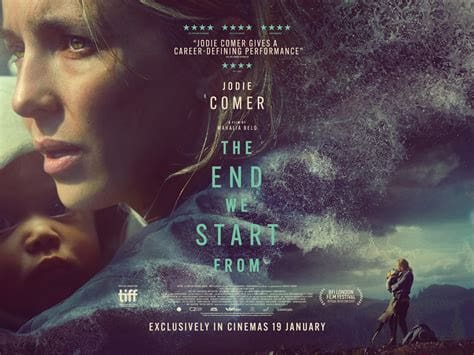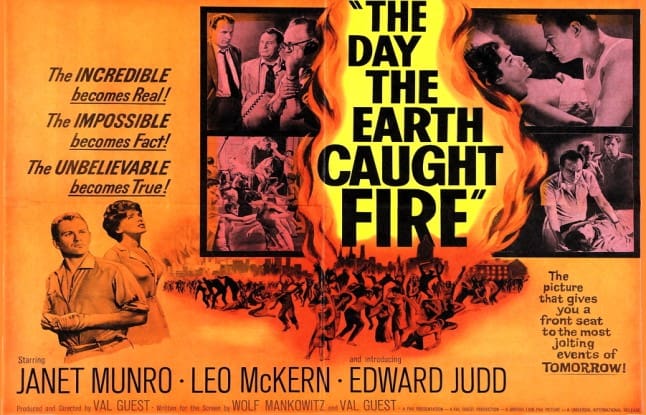Richard Cope, author of Global Outlook on Sustainability, examines how environmental films and modern cinema are addressing the climate crisis. He explores the role of sustainability in storytelling and the impact of these films on raising awareness.
“We’ve never seen tornadoes like this before,” says storm chaser Ravi in Twisters (Lee Isaac Chung, 2024), but the phrase “climate change” never passes his lips. Whilst the science remains inconclusive on whether global warming can be connected to tornadoes as readily as hurricanes, the movie refuses to even speculate, with its Director telling CNN “I wanted to make sure that we are never creating a feeling that we’re preaching a message, because that’s certainly not what I think cinema should be about. I think it should be a reflection of the world.” For me, this represents a cowardly, commercially driven neglect of artistic duty. If we look past the summer blockbusters, however, we can find cinematic climate allegories aplenty.

58% of consumers say that extreme weather events in their country encourage them to personally do more to protect the environment, up four points since 2021.
Source: Global Outlook on Sustainability: A Consumer Study 2024-25
Themes explores evironmental films
Survival of the fittest
The End We Start From (Mahalia Belo, 2023) embraces the existential threat posed by climate change at the level of family drama, as new parents played by Jodie Comer and Joel Fry find themselves submerged and then separated in a rapidly disintegrating Britain, where rain pours down incessantly, like some biblical take on all those jibes from visitors about its terrible weather. This dystopian drowning is no national joke, however, with Europe as a whole having experienced 7% more rain in 2023 than the 1991-2020 average.

49% of consumers agree “I believe that the country where I live is suffering from climate change” up from 47% in 2021.
Source: Global Outlook on Sustainability: A Consumer Study 2024-25
The film’s depiction of a crumbling society dropping the stiff upper lip approach and fighting for food initially recalls many familiar tropes from similarly themed Brit-Apocalypse classics like The Day the Earth Caught Fire (Val Guest, 1961) and the BBC’s adaptation of Day of the Triffids (Ken Hannam,1981), before it embarks on a more interesting exploration of gender roles. Our data confirms certain gender clichés around women being more engaged and active on climate issues (they are six points less likely to be climate change deniers than men for example) and in the movie, as her partner wilts under the pressure, its mother Comer who goes it alone with her child, fighting to survive, make it back home and reunite the family.
49% of women agree “my behaviour can make a positive difference to the environment” compared with 45% of men.
Source: Global Outlook on Sustainability: A Consumer Study 2024-25
The drive to stay alive takes a darker turn in La Règne Animal (Thomas Cailley, 2023), where in an extreme “if you can’t beat ‘em join ‘em” endgame people begin gorily mutating into animals and heading out into the forests for a life less human.

Appreciation for the simple things
A purist alternative for the concept of ‘sustainability’ might be efficiency, defined as achieving more (or the same) with less. This theme is explored from two contrasting starting points in our next two films.
25% of consumers say they have grown their own food in a garden/outdoor space (e.g. balcony) in 2024, up 2 points since 2021.
Source: Global Outlook on Sustainability: A Consumer Study 2024-25
In Perfect Days (Wim Wenders, 2023), Tokyo public toilet cleaner Hirayama (played by Koji Yakusho) enjoys a blissful – almost ascetic – existence, anchored in the simple comforts of diligent public service, communing with nature and minimal materialism. Hirayama’s daily routine is anchored in procuring – and nurturing – new plants, reading used paperback editions of literary classics and driving to work listening to vintage cassettes of Patti Smith and Lou Reed (which are amusingly coveted for their credibility and currency value by his young co-worker and his girlfriend).

Inside (Vasilis Katsoupsis, 2023) meanwhile gives us art thief Nemo (a wonderfully feral Willem Dafoe) fighting against enforced domestication, trapped in a luxury Manhattan penthouse with everything and nothing. After successfully breaking in, Nemo finds himself incarcerated in a life of luxury and emptiness. The challenges in his bunker-like existence mount and initial battles with the alarm system and a downed internet soon seem trifling, as the themes around opulence, essentials and vulnerabilities come thick and fast. A malfunctioning air conditioning system creates a microclimate of perpetually pivoting extreme heat and cold. He competes with the houseplants for their automated water supply, kills and eats raw aquarium fish and begins precariously piling up luxury furniture into a possible escape route.

Power to the workers and how to say sorry
Honourable mentions should also be made to a couple of earlier releases.
Can any movie that ends with a (spoiler alert) “cheeseburger to go” really have a sustainable interpretation? The Menu (Mark Mylod, 2022) certainly can as it has a subtext around service, supply chains and inequalities in our system. The plot deals with an array of super rich and seemingly sullied guests embarking on the exclusive remote island restaurant of Hawthorne. Once there, we focus on diners Anya Taylor-Joy and Nicholas Hoult and super chef Ralph Fiennes, whose increasingly alarming between-course pronouncements culminate in a deliciously satisfying serving of humiliation and revenge, harking back to The Most Dangerous Game (Irving Pichel and Ernest B. Schoedsack, 1932).
24% of consumers say that “Unfair pay for workers in the country where I live” is one of their top three social concerns.
Source: Global Outlook on Sustainability: A Consumer Study 2024-25

Is there even a sustainable angle for Barbie (2023, Greta Gerwig)?
That may seem hard to accept at first. We’re talking about a film that glorifies consumerism, one that exhausted global supplies of pink paint and one that will increase – by millions – sales of plastic dolls that each cause 660 grams of carbon emissions. Yet, despite all that, Mattel, by addressing ethics and past sins head-on has opened up new routes to follow for other businesses seeking to pivot or progress.
Barbie will be remembered less as a movie and more as a most outrageous example of self-reflexive rebranding on the part of its producer (and subject) Mattel. The brand has performed an incredible act of contortion – defined as “the skill of twisting and bending one’s body into strange and unnatural positions as a form of entertainment” – that sees it ridicule its supposed contribution to (and profit from) gender clichés, reinvent itself, move on and then make even more money in the process.
Even adults who scalped and tortured their dolls in their youth embraced Barbie’s pivot and this suggests how other transgressive companies that have previously profited from plundering the natural world and exploiting its people (i.e. most of them) might also find exit routes to redemption as part of a very necessary process to acknowledge, apologise and adapt.

Do you want strategic insight into your global sustainability messaging?
The much-anticipated Global Outlook on Sustainability: A Consumer Study 2024-25 is now available to order. Covering 10,000 respondents from 10 leading economies, this report gives insights and inspiration on how best to position and prioritise your brands’ products.
Download the executive summary for a detailed overview or order the Global Sustainability Report today!








